Cam McEvoy Is Living Life in the Fast ‘Lane’; Aussie Star Has Resurrected His Career
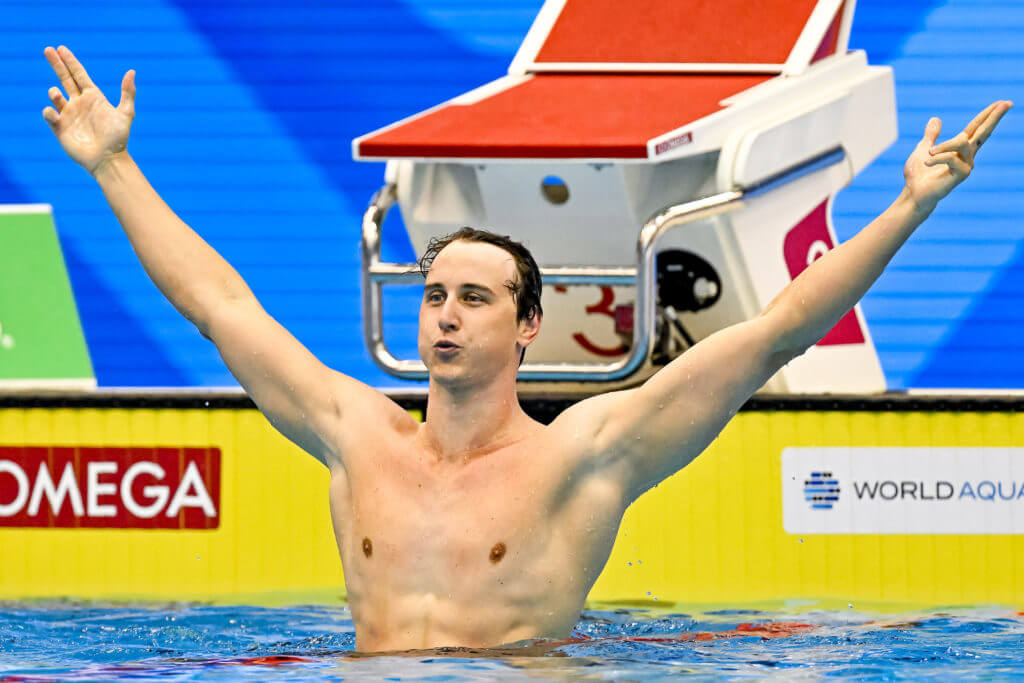
Cam McEvoy Is Living Life in the Fast ‘Lane’; Aussie Star Has Resurrected His Career
Cam McEvoy resurrects a 20-year sprinting odyssey in Coach Tim Lane’s “Fast Lane to Fukuoka,” a pool of resistance and a little help from his friends.
Getting to the bottom of Australian Cam McEvoy’s Fukuoka revival in July of 2023 at age 29 was always going to be an intriguing story to say the least—a career spanning 20 years and three Olympic Games as he was preparing for a fifth World Championships in the fastest form of his life.
Cam and his coach, Tim Lane, didn’t disappoint when they revealed the back story behind McEvoy’s extraordinary swimming resurrection that surfaced with one of the biggest splashes of this year’s World Championships.
It came after the formation of a team that has listened, learned, implemented and delivered a swimming revival for the ages…and a man in Coach Lane who was quick to ensure that this was Cam’s story to tell.
This was a team led by McEvoy and coordinated by Lane that also included Queensland Academy of Sport (QAS) sports science guru, Nick Smith, and former British strength and conditioning coach, Scott Pollock.
McEvoy and Lane have provided Swimming World with exclusive insights into how a combination of extreme ownership, special relationships, a lifelong love of swimming and its learnings provided answers of how to get from one end of a 50-meter pool to the other as fast as you possibly can.
JOINING SWIMMING’S ELITE
In just three dynamic swims this summer at the World Championships in Fukuoka…over two action-packed days…in a combined time of just over a minute, this inquisitive, intuitive and intriguing physics-and-math graduate from Queensland’s Gold Coast campus of Griffith University reignited and recaptured the imagination of the swimming world, taking:
- 21.35 seconds to top the heats of the 50-meter freestyle on the morning of July 28;
- 21.25 seconds to lead the semifinals of the 50-meter freestyle on the evening of July 28; and
- 21.06 seconds to win the prized gold medal in the final of the World Championships 50-meter freestyle on July 29.
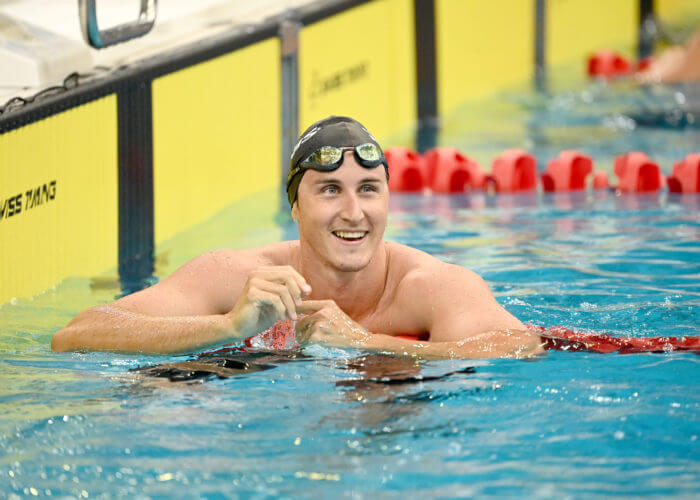
Photo Courtesy:
McEvoy became the fourth fastest swimmer ever with the sixth fastest time in history in a new Commonwealth, Australian and Oceania record—with all of this coming after McEvoy’s tell-tale 21.27 to signal his intentions at the Australian Trials in Melbourne in June.
He was crowned world champion in an event that was first swum and won by American trailblazer Tom Jager in 22.49 seconds when the eight fastest swimmers in the world at the time lined up in an historic, first-ever 50-meter freestyle at the World Championships in Madrid in 1986.
McEvoy is now the 16th winner and only the 11th person to conquer swimming’s fastest race, joining the likes of world record holder and three-time champion Cesar Cielo of Brazil and two-time American winners Jager and Caeleb Dressel as well as Russia’s Alex Popov.
A REBIRTH
It was a rebirth that began with a chance meeting with former world record holder and fellow Australian Dolphins-turned coach and commentator, Bobby Hurley, at the Australian Short Course Championships at Sydney’s Pool of Dreams last August when McEvoy was looking to reignite his career after time away from the fast lane.
Here was a triple Olympian (2012-16-20) who wanted to find an opportunity to implement a litany of his own ideas and still find a coach to work with him and facilitate that.
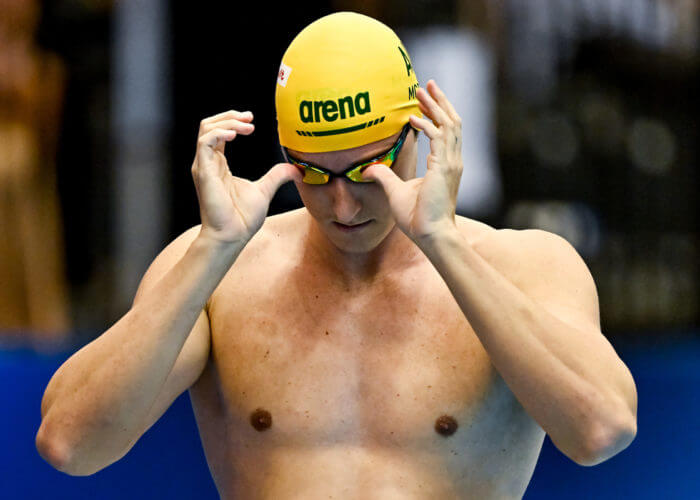
Photo Courtesy: Andrea Masini / Deepbluemedia / Insidefoto
“The approach I took I guess was like extreme ownership in a way, spending a lot of time really thinking about what the best approach would be and how it would make sense—taking a lot of inspiration away from other sports, like track, Olympic weightlifting, calisthenics, general gym strength approaches and philosophies,” said McEvoy.
“I even (considered) the way javelin throwers think about their connected change from their hands to their feet when they throw. (It was about) a lot of different philosophies and influences from different sports, trying to conceptualize them in swimming—and the results have been amazing. (It’s) something that has definitely been a part of my character of who I am.
“Way back when I was 11, I was trying to critically think about what training is and how I can get myself better. From then on—as early as I can remember—I’ve been like a sponge, every day, soaking up every session, every season, having different thoughts and letting them evolve all the time.
“But it wasn’t until I was put in contact with Tim Lane that I was allowed to have the space and the freedom to really just do it exactly how I thought and see where it went.”
ENTER COACH TIM LANE
Tim Lane, an Australian-born swimmer from the NSW South Coast, swam at the University of North Carolina-Wilmington for two years in 2005-07 for Coach Todd DeSorbo. He then served as a graduate assistant coach alongside his mentor (who turned out to be one of Lane’s biggest coaching influences) as Lane started his career in coaching.
Lane coached Hurley onto the 2016 Australian World Short Course Team out of the Warringah Aquatic program, and in 2019, was appointed director of swimming at Brisbane’s Somerville House Girls School, the heart of one of the most vibrant swimming regions anywhere in the world.
Hurley told McEvoy that Lane would be someone worth contacting…and McEvoy jumped at the opportunity.
Lane recalled that he had a couple of weeks to sit down and organize his thoughts as to how he might be able to add value or just guidance to one of Australia’s fastest swimmers who was at the crossroads of a brilliant career.
“I said to Cam that ultimately you don’t have too many laps left in the sport at your age, particularly with the style of training you have done in the past,” recalled Lane.
“Number one, we need to find a training stimulus that you haven’t been exposed to before, and number two, we both have to believe that stimulus is going to be beneficial to you moving forward.
IMPORTANCE OF RESISTANCE TRAINING
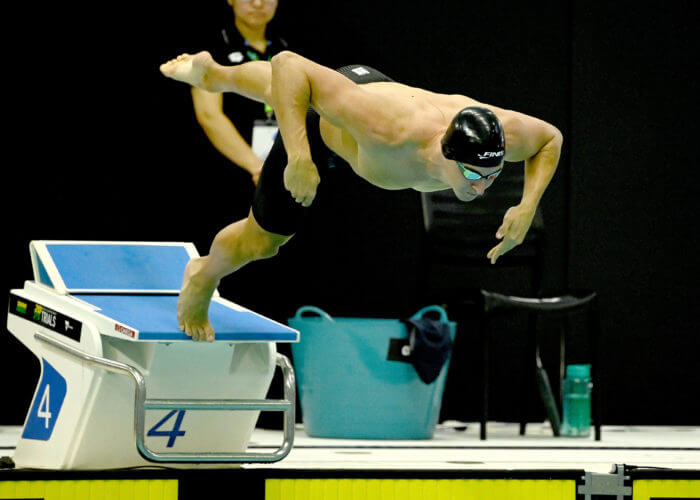
Photo Courtesy: Delly Carr Swimming Australia
“For me in my experience in the U.S., it was pretty clear that resistance training and, specifically, resistance training in the water and building strength in the water—if you hadn’t done that before—was the pathway forward,” Lane said. “And Cam agreed almost straightaway. He bought into that concept of restructuring his training completely around building strength specific to freestyle in the water.
“And what Cam has then done with that—with the support of Nick (senior movement scientist at the QAS)—has been unbelievable with what we are doing.
“So, Nick was on board immediately, and then his strength coach at the QAS, Scott Pollock (QAS strength and conditioning coach as well as the national technical lead strength and conditioning coach at Swimming Australia) has been world-class. Pollock also formerly served as the strength and conditioning coach with British Swimming and British Cycling.
“Cam now has a really good team around him who deserve a lot of acknowledgements for the roles they have played in this—other than Cam himself, of course—in what he brings to the table.
“With Cam’s ideas and his understanding of what his needs are and how to apply general concepts and how to make them very, very specific is elite.”
McEvoy works with Smith once a week out at the 25-meter QAS pool at Mt. Gravatt on the outskirts of Brisbane, sometimes twice a week, with all of his testing in particular with his start and that first 15, 20 and 25 meters crucial to the end result.
TRAINING SPECIFICS
“Consistency in the way we trained was the key,” said McEvoy. “We did so much race pace in training, and regardless of the general rhythm of fatigue that I went through throughout the season, we still had so many instances where I was able to get up and hit certain goal times in training that we were aiming for.
“So, every Monday, once a week, I’d be at QAS to do top-end dive 25s—we’d have everything measured under the microscope and be hypo-critical about it, and it was all electronically timed.
“We did over 200 dive 25s in that kind of environment from October ’22 to Worlds in July ’23—from just one day a week, let alone what I did in the other sessions.
“Three or four times in the season, the times I would throw down in a particular session on a Monday at the QAS pool would be pretty much bang or within 2-hundredths of a second either way of the time I would do for the first 25 meters in the 50-meter competition.
“I was heavily de-trained when I first started after 12 months off. I started out at 10.30 for a dive 25, and by the time I had left for Worlds, I was trying to beat Usain Bolt’s 100-meter record on the track of 9.59.
“(There were) massive improvements over such a short distance, and it was just fun, so exciting to have so many weeks and have the excitement of hitting a personal best and being like a teenage kid again where you are just dropping PBs every week or so.
“Every time you race—just because it was such a new stimulus that I had never done before—it was the first time I had the chance to lay down a baseline of what I could do.
“So when I went up behind the blocks in the heat, semi and the final in Fukuoka, I just imagined that I was at that QAS pool, that Nick was the starter calling me up, and he was just standing there really excited to see if I’d get a take-off velocity PB and PBs at 15 meters or 25 meters. And that familiarity in an environment like a World Championships final went a long way.
WHERE CREDIT IS DUE
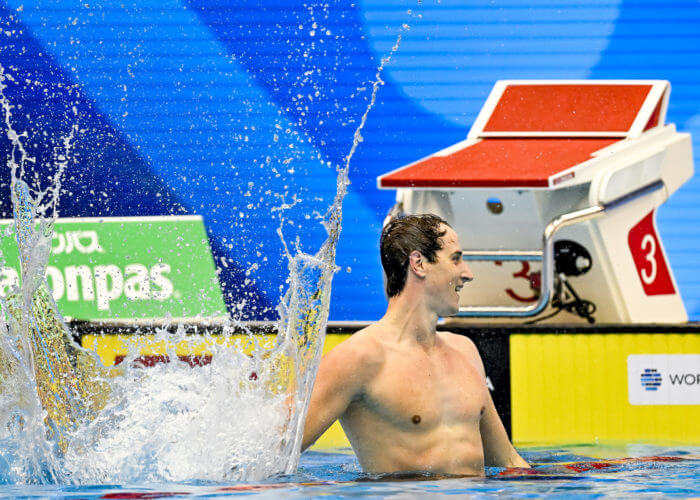
Photo Courtesy: Andrea Masini / Deepbluemedia / Insidefoto
“So, it was Tim, Nick and the other guys I work with at QAS when I won the final in my best time and did my celebration, I felt like I couldn’t wait to talk to them and reconnect with them and share the excitement that they’d be feeling for me for doing what I did.
“The results at Worlds and at Trials would be nothing if it wasn’t for Tim and Nick—those two guys were effectively the grounding of everything I came up with—the implementation of it all—the guidance of it all and…it’s not just a physical approach.
“Tim managed the psychological aspects of the training and racing and where my head was at on a day-to-day basis and in competition…and then Nick’s insights at the QAS—a lot of my approach is rooted in science.
“I had a lot of ideas, and I would come to Nick and just dump all my ideas onto him—and, ‘OK, how do we test it? How do we put it into action’?—and within a day, Nick had developed this whole protocol: ‘We can do this and this, we can test this, we can use this to measure that’…and we had such a high turnover for some really cool and new stuff that we did. So definitely, without Nick and Tim, it would not be what it was! It’s just one of those things where literally everything aligned in terms of where I was at with my career.
FROM CAM’S PERSPECTIVE
“When I went my 21.27 at Trials, I was ecstatic—the first PB I had done in so long—and it wasn’t until I had done my heat swim at the World Championships, where I guess true peacefulness fell over me.
“I’d had so many years in a row where, domestically, I was decent, and then I’d come to an international comp, and all the demi-factors would come together to produce a performance that wasn’t there.
“And there was a belief that developed around my ability to swim well internationally. So, going into Worlds, I was a little nervous about that belief—it stays with you regardless of that rationale and logic and everything like that, but the heat felt awesome.
“I could see in my peripherals, I was swimming away from the guys either side of me—which was also really exciting—and I hit that 21.35, which was the quickest I’d ever done internationally. It was faster than my previous best time from 2016, and that whole day, I was just sitting back, internally smiling to myself.
“Just how nice it was to be in the position I was in…a privilege to be able to have the capacity to dive into a 50-free race and do those times in that environment…so, I’d probably say post-heats at the World Championships is where the enormity of the last nine months really sunk in!”
* * *
Says Lane: “This is all about Cam McEvoy. He has got his DNA all over this. What Cam brings to the table as an athlete and as a swimming mind is extraordinary! Moving forward, this story is far from finished. It is almost limitless.
“And the fun part for Cam is that he has a new lease on life. He’s loving his swimming and enjoying everything about it. And if you can get through three Olympics and get to this age in your career…and if it was to end in a couple of years, with a really positive relationship with something that you have poured your entire life into…that would be amazing! And not a lot of swimmers get to the end, feeling like that about swimming….”
Author’s Note: And in our hour-and-a-half of discussions, there was not one mention of world records or Olympic gold medals. But you get the feeling that this is only the beginning for a swimmer who has certainly found his fast “Lane!”



